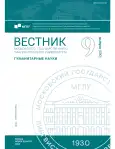ОПЫТ ЭКСПЕРИМЕНТАЛЬНОГО ИССЛЕДОВАНИЯ АВТО- И ГЕТЕРОСТЕРЕОТИПОВ ШВЕДОВ
- Авторы: Баранов Ю.В.1
-
Учреждения:
- Московский государственный лингвистический университет
- Выпуск: № 9(890) (2024)
- Страницы: 29-36
- Раздел: Языкознание
- URL: https://journal-vniispk.ru/2542-2197/article/view/297408
- ID: 297408
Цитировать
Аннотация
Результативным способом изучения представлений различных этносов о себе и других народах в психолингвистике стал анализ ассоциативных полей лексем, представляющих этнонимы и базовые ценности. С помощью анализа ассоциативных полей этнонимов шведский, русский, немецкий автор устанавливает актуальное содержание гетеростереотипов - представлений шведов о русских и немцах, а также делает некоторые наблюдения о содержании автостереотипа шведов.
Ключевые слова
Об авторах
Юрий Викторович Баранов
Московский государственный лингвистический университет
Автор, ответственный за переписку.
Email: formosa2020@mail.ru
старший преподаватель кафедры лингвистики и межкультурной коммуникации факультета заочного обучения Московского государственный лингвистический университет
РоссияСписок литературы
- Пищальникова В. А.Ассоциативный эксперимент и психолингвистическое исследование личностной идентичности // Вестник Московского государственного лингвистического университета. Гуманитарные науки. 2021. Вып. 2 (844). С. 105–118. doi: 10.52070/2542-2197_2021_2_844_105.
- Пищальникова В. А., Адамова З. Г., Хлопова А. И. и др. Мультиязычный ассоциативный словарь базовых ценностей. М.: ФГБОУ ВО МГЛУ, 2024.
- Бут М. Почти идеальные люди. М. : Издательство «Э», 2017.
- Экерстрём Л. Секрет шведского благополучия. М.: Издательство КоЛибри, Азбука-Аттикус, 2019.
- Knopp G., Brauburger S., Arens P. DieDeutschen. VomMittelalterbiszum 20. Jahrhundert. München: Bertelsmann, 2008.
- Jehle M. et al. Die Deutschen. Geschichte und Tradition / M. Jehle, E. Hafner, L. Kölm, M. Schippan, A. Wunsch. Köln: Helmut Lingen Verlag, 2012.
Дополнительные файлы











